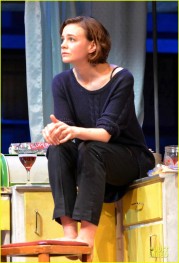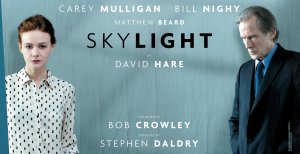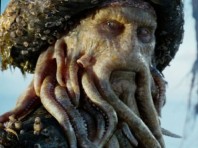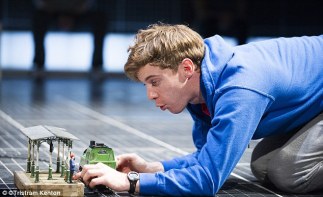
I have this uneasy feeling that some people always look stylish. Perhaps this is just a paranoid fantasy from which all twenty-something year old females suffer, but I can’t help but wake up screaming with visions of girls who apply mascara, straighteners or bras for the most trifling of social functions. Even trousers seem a far cry from my preferred outfit: pyjamas at all times (a possible title for my autobiography or epitaph for my tombstone). And, when pyjamas are absolutely socially unacceptable, skinny jeans and a baggy jumper. But it is reassuring, not to mention elating, that I have now witnessed the mother of all comfy jumpers as modelled the other night by actress Carey Mulligan in Sir David Hare’s play Skylight. And whilst she made the voluminous jumper more glamorous than if it had been a Vera Wang wedding dress – a feat that I, in its doppelgänger, seated in Row C of the Hexham Forum Cinema, alas cannot boast – it does at least allow me a review of the latest National Theatre production screenings. Hell of a segue, huh?
On booking the tickets for this show, I cannot stress how little I knew about this play. I hadn’t seen a review and I had avoided all mentions of plot twists. For all I knew it could have been an all-Japanese, ballet, farce set in the wake of an apocalypse caused by an evil god whose cruelty knew no bounds and who had unleashed, for reasons known only to himself, a plague of man-eating gerbils. The only thing I knew – other than the baffling and, ironically, unenlightening title, Skylight – was the cast list. But that was more than a recommendation. The words ‘Bill Nighy’ followed by the words ‘Carey Mulligan’ sent me into a fit of gleeful excitement, and I would have paid double the cinema ticket (yes, that’s right ladies and gentlemen, a whole £22) to see them read the Encyclopaedia Britannica, dance the  tarantella, or eat cheese. I was, if anything, slightly disappointed when, on popping to the loo before the play began – a treat afforded me because there was, for peculiar reasons, a woman sitting in my seat when I arrived, who had to be removed by the relevant authorities – I was diverted from the tedium of loo-going by reading the handily placed synopsis on the back of the cubicle door, and learned that it was not the Simon Pegg inspired rodent debacle that I had conjectured. I shall give you a brief and largely unhelpful summary. Basically, it’s one of those two-people-in-one-room, set-in-real-time sort of fandangos that sounds intrinsically self-righteous (which it is) and extremely dull (which, mercifully, it isn’t). Kyra – Queen of the pixie cut, Carey Mulligan – is an impoverished, do-gooding, teacher in the East End (think Slumdog Millionaire but with snow) living in a London flat with little more than a red scarf and some onions for company, when she is unexpectedly visited by three ghosts… No wait. That’s Muppet’s Christmas Carol. Or, if you prefer, Dickens’ Christmas Carol. Thirty year old Kyra is visited by two people. First by 18 year old Edward, who brings her some rap music, sulks about the death of his mother and his insufferable father, and then the two of them cosily discuss the joys of going out for breakfast. Edward then pootles off, and said-father Tom completely coincidentally drops by, played by none other than squid face, Bill Nighy. And so it begins. The play is a clash of political ideals, and Tom is Thatcher to Kyra’s Blair: a rich, greedy, entrepreneur restauranteur and recent widower, who just happens to be her ex-employer and ex-lover. Although their real life 35 year age gap is perhaps a touch Operation Yewtree. The story of their affair and the future of their relationship unfolds over a spag bol supper. The begging question is the cliched ‘will they, won’t they’, and the fate of their relationship hangs in the balance, dependent on whether they can successfully reconcile their opposing political beliefs before the pasta goes cold. With me so far? It is also suffice it to say that skylights, whilst they do feature, have a minor part to play in the action and are not recreated in the set by gouging a large hole in the roof of Wyndham’s.
tarantella, or eat cheese. I was, if anything, slightly disappointed when, on popping to the loo before the play began – a treat afforded me because there was, for peculiar reasons, a woman sitting in my seat when I arrived, who had to be removed by the relevant authorities – I was diverted from the tedium of loo-going by reading the handily placed synopsis on the back of the cubicle door, and learned that it was not the Simon Pegg inspired rodent debacle that I had conjectured. I shall give you a brief and largely unhelpful summary. Basically, it’s one of those two-people-in-one-room, set-in-real-time sort of fandangos that sounds intrinsically self-righteous (which it is) and extremely dull (which, mercifully, it isn’t). Kyra – Queen of the pixie cut, Carey Mulligan – is an impoverished, do-gooding, teacher in the East End (think Slumdog Millionaire but with snow) living in a London flat with little more than a red scarf and some onions for company, when she is unexpectedly visited by three ghosts… No wait. That’s Muppet’s Christmas Carol. Or, if you prefer, Dickens’ Christmas Carol. Thirty year old Kyra is visited by two people. First by 18 year old Edward, who brings her some rap music, sulks about the death of his mother and his insufferable father, and then the two of them cosily discuss the joys of going out for breakfast. Edward then pootles off, and said-father Tom completely coincidentally drops by, played by none other than squid face, Bill Nighy. And so it begins. The play is a clash of political ideals, and Tom is Thatcher to Kyra’s Blair: a rich, greedy, entrepreneur restauranteur and recent widower, who just happens to be her ex-employer and ex-lover. Although their real life 35 year age gap is perhaps a touch Operation Yewtree. The story of their affair and the future of their relationship unfolds over a spag bol supper. The begging question is the cliched ‘will they, won’t they’, and the fate of their relationship hangs in the balance, dependent on whether they can successfully reconcile their opposing political beliefs before the pasta goes cold. With me so far? It is also suffice it to say that skylights, whilst they do feature, have a minor part to play in the action and are not recreated in the set by gouging a large hole in the roof of Wyndham’s.

Let me turn quickly, therefore, to the set. Wyndham’s Theatre is utterly enchanting and an absolute privilege to sit in, but the seats are narrower than the average twenty-first century viewer’s buttocks and therefore I was grateful to be reclining in luxury in a modern cinema seat. However, director Stephen Daldry, who directed the enjoyable, smash hit Billy Elliot and then regrettably took a nosedive directing Hare’s own adaptation of The Reader – probably the longest and most boring film about the Holocaust ever made – managed to restore my faith in him here. Although I do question the wisdom of setting Skylight in the 80s, complete with rotary dial phone and brown floral cooking pots, when the play is so obviously a product of the 90s. Aesthetically, it looked sensational and the space worked really well for what he wanted to create. The backdrop of the other flats and the layers of rooms, with a sliding wall to hide the bathroom if necessary, was fluid, easy and natural. It wasn’t fussy, it didn’t get in the way, and it didn’t gently rotate or do anything unnecessary just because it could. Kudos. The entire first half happens whilst Kyra actually makes dinner onstage. Pretentious? Yes, probably, but I loved it. A bit of pretension hurts nobody. And, while what I actually did was wonder how she didn’t cry whilst chopping onions, and whether the sound guys were kicking themselves as the bubbling sauce sounded like a freight train in a windy tunnel, my parents were busy grumbling that she seemed to be cooking a meal for fifty on her tiny pauper’s budget. But it turns out that I’m simply a sucker for a bit of onstage snow. When it happened in Stratford’s Beauty and the Beast, the Comedy Theatre’s La Bête and now at the end of Skylight, it’s all I can do not to applaud with teary and childlike wonder. What can I say? I’m easily amused.
 The acting was utterly flawless, which I suppose is easier when there are only three actors, rather than Hamlet or Guys and Dolls where there’s a whole throng of them to forget their lines or overact. But fair’s fair. Even three people have the potential to make a hash of it. But Nighy and Mulligan were faultless in their contrasting and complementary performances. There is momentum, humour and purpose to Nighy’s rambling style; his chaotic descriptions, swearing and gesticulating. His tics and jerks are so incredible, so attuned to the character, that it’s hard – if not impossible – to discover where Tom ends and Nighy begins. How do you make Dupuytren’s Contractures so effortlessly and mesmerisingly part of a character? His timing and pacing are impeccable, capturing and exacerbating every moment of comedy. His long speeches are broken up with confused fragments about his late wife and the room he built for her, the crumbling of their relationship and the revelation of what happened between him and Kyra. Nighy handles this with aplomb. It is not overly soupy, apologetic or caricatured anger. Tom is a man caught in the confusion of grief and relief: both longing for the past and yet wishing it had played out differently. As more is revealed, it is hard to say whether I felt greater pity for him or began to despise him. And it’s this conflict that he treads so artfully. He is a terrific actor, worthy of any award the powers that be can throw at him. Plus, if all teenage girls want to be BFFs with Jennifer Lawrence, does that mean that Carey Mulligan is going spare? And that I can have her? There is an understated quality and sincerity to Mulligan
The acting was utterly flawless, which I suppose is easier when there are only three actors, rather than Hamlet or Guys and Dolls where there’s a whole throng of them to forget their lines or overact. But fair’s fair. Even three people have the potential to make a hash of it. But Nighy and Mulligan were faultless in their contrasting and complementary performances. There is momentum, humour and purpose to Nighy’s rambling style; his chaotic descriptions, swearing and gesticulating. His tics and jerks are so incredible, so attuned to the character, that it’s hard – if not impossible – to discover where Tom ends and Nighy begins. How do you make Dupuytren’s Contractures so effortlessly and mesmerisingly part of a character? His timing and pacing are impeccable, capturing and exacerbating every moment of comedy. His long speeches are broken up with confused fragments about his late wife and the room he built for her, the crumbling of their relationship and the revelation of what happened between him and Kyra. Nighy handles this with aplomb. It is not overly soupy, apologetic or caricatured anger. Tom is a man caught in the confusion of grief and relief: both longing for the past and yet wishing it had played out differently. As more is revealed, it is hard to say whether I felt greater pity for him or began to despise him. And it’s this conflict that he treads so artfully. He is a terrific actor, worthy of any award the powers that be can throw at him. Plus, if all teenage girls want to be BFFs with Jennifer Lawrence, does that mean that Carey Mulligan is going spare? And that I can have her? There is an understated quality and sincerity to Mulligan  whose ability knows no bounds. She really listens. Her stillness is entrancing, as she doesn’t overact in the shadows, yet your eye is drawn to her. She is a simply superb actress who, I hope, goes far after this whirlwind of a West End debut. Unlike a whole host of pretty girls I can think of, she doesn’t hide behind her hair – she can’t! And it may be a strange thing to say, but she isn’t afraid of her face. She isn’t frightened of laughing, smiling, crying (on which note, she evidently attended the same school as Tom Hiddleston and is capable of filling the auditorium in a Noah-esque deluge) and all those other emotions that unappealingly scrunch the porcelain features. What I’m saying is that Mulligan is confident enough in her abilities and beauty to look ugly. It’s her greatest gift. Oh, and Matthew Beard as Tom’s son Edward, who I fear will be forgotten and overlooked by critics everywhere. I don’t know whether he was an avid stalker of Bill Nighy before rehearsals kicked off, but to hit every mannerism so completely on the head like that must have taken some work, and possibly night vision goggles and a zoom lens. It’s clever stuff, this acting business.
whose ability knows no bounds. She really listens. Her stillness is entrancing, as she doesn’t overact in the shadows, yet your eye is drawn to her. She is a simply superb actress who, I hope, goes far after this whirlwind of a West End debut. Unlike a whole host of pretty girls I can think of, she doesn’t hide behind her hair – she can’t! And it may be a strange thing to say, but she isn’t afraid of her face. She isn’t frightened of laughing, smiling, crying (on which note, she evidently attended the same school as Tom Hiddleston and is capable of filling the auditorium in a Noah-esque deluge) and all those other emotions that unappealingly scrunch the porcelain features. What I’m saying is that Mulligan is confident enough in her abilities and beauty to look ugly. It’s her greatest gift. Oh, and Matthew Beard as Tom’s son Edward, who I fear will be forgotten and overlooked by critics everywhere. I don’t know whether he was an avid stalker of Bill Nighy before rehearsals kicked off, but to hit every mannerism so completely on the head like that must have taken some work, and possibly night vision goggles and a zoom lens. It’s clever stuff, this acting business.
Yes, if the play had a fault, or anything less than five blazing stars lighting every headline, it was not because of the actors. Sad, and far less fixable, is the truth. The problem with Skylight is the play itself. Like more and more plays I see at the moment it had real second act problems. The first half was quick, witty with a touch of pathos and mystery, and even a bit of sentimentality that didn’t have me (and more astoundingly, my mother) reaching with exaggerated gasps for the sick bucket. But that was it. All the plot and drive and excitement, over and done by the interval, with the result that when we returned, after ice cream and a costume change, it was to an equally long and sanctimonious sermon. We get it David. You’re a Blairite. Duly noted. Now please feel free to say something else. No, really. Don’t hesitate. We get that you think teaching is a worthwhile and under-paid profession. And somewhere through the fifth hour we’ve grasped that you admire public servants. And whilst the live audience in London applauded these over-egged sentiments in a ‘yah boo sucks Mr Cameron’ sort of way – ‘bring back the liberal haven of the 90s and down with the bankers’ – Hare’s writing was about as subtle as a herd of rhinos at afternoon tea in Claridges. It was more broken teacups and irate cucumber sandwiches, than sophisticated satire. Not to mention Hare’s apparently somewhat hazy memory of the 90s. Does anyone else remember the idyll of socialist freedoms under Mr Blair in which bankers were forced to donate their annual bonuses to needy children? No. Me neither. Does the word Iraq mean nothing to you, David? But I digress. To have produced such an intricate, intelligent and tangly first half, it was disappointing for the curtain to rise on a preachy and artless one note samba of a second half. There was no hint of nuance to the argument that takes place between Tom and Kyra. Nor was there any hint that it would ever end. It was just a Groundhog Day snooze-fest of the same obvious points: ‘I’m all damaged and liberal and unvalued by society’ versus ‘I may be a pig, but I’m rich and you’re jealous so stop living in a fairytale’. Let me add that this goes on for a good forty minutes of my life. Forty minutes which I must stress I will never get back. Ever.
On a side issue, may I just ask why directors feel the need to have women take their tops off in the middle of arguments? Culturally ingrained casual sexism is something I value so much over my tub of vanilla ice cream. Still, considering that for the sake of realism we were forced to watch the preparation of actually spaghetti really bolognese earlier, I’m not convinced that women, in the throes of political debate, feel the need to strip down to their bras. Vulnerability is not something people search for when quarreling. I’ve never watched a live international political debate per se, but I’m sure it is not the mainstay of Merkel’s technique. Nor, for that matter, was it Thatcher’s.
 And so at last, with a sigh of relief, I turn to the ending. I won’t tell you if there is resolution between Kyra and Tom, what it is (if there is any), and whether at this point we care. But – spoiler alert – Kyra is left alone until Edward comes back, most uncivilised at some ungodly hour of the morning. With breakfast. I think it’s meant to be symbolic. She misses going out for breakfast because it represents Tom, his restaurant and the days when they were a family. But Edward’s too naive to realise that his father and Kyra were having an affair, so to him it’s just… eggs. I can instantly think of better ways to have ended the play, but Hare gives it a cyclical nature that GCSE creative writing students would beam upon, and it’s only very twee rather than actively nauseating. But David Hare, in amongst his didactic politics, has got something right. And it is the lasting message which, several weeks on, will journey through the ages as the cornerstone of Skylight‘s philosophy. Going out for breakfast truly is one of life’s greatest pleasures.
And so at last, with a sigh of relief, I turn to the ending. I won’t tell you if there is resolution between Kyra and Tom, what it is (if there is any), and whether at this point we care. But – spoiler alert – Kyra is left alone until Edward comes back, most uncivilised at some ungodly hour of the morning. With breakfast. I think it’s meant to be symbolic. She misses going out for breakfast because it represents Tom, his restaurant and the days when they were a family. But Edward’s too naive to realise that his father and Kyra were having an affair, so to him it’s just… eggs. I can instantly think of better ways to have ended the play, but Hare gives it a cyclical nature that GCSE creative writing students would beam upon, and it’s only very twee rather than actively nauseating. But David Hare, in amongst his didactic politics, has got something right. And it is the lasting message which, several weeks on, will journey through the ages as the cornerstone of Skylight‘s philosophy. Going out for breakfast truly is one of life’s greatest pleasures.

 people would have to be fired into space on rockets to get there, and they aren’t or people would notice’. Even the moving and magical scene in which Christopher imagines himself achieving his dreams, floating in space as an astronaut, the constellations drawn out in lights on the floor, can’t help but add his pet rat Toby drifting about in zero-gravity in a hamster-ball. Pictures are a big part of the book and Christopher’s explanation of the way he views the world. In the play, the whole floor acted as a gigantic blackboard on which Christopher drew, attempting to understand what facial expressions denote. He tried, for example, to understand how ‘if you raise one eyebrow it can mean lots of different things. It can mean, I want to do sex with you, and it can also mean, I think what you just said was very stupid’. Seeing the world through Christopher’s eyes perfectly captured the book, its quirkiness, its humour and its philosophical nature.
people would have to be fired into space on rockets to get there, and they aren’t or people would notice’. Even the moving and magical scene in which Christopher imagines himself achieving his dreams, floating in space as an astronaut, the constellations drawn out in lights on the floor, can’t help but add his pet rat Toby drifting about in zero-gravity in a hamster-ball. Pictures are a big part of the book and Christopher’s explanation of the way he views the world. In the play, the whole floor acted as a gigantic blackboard on which Christopher drew, attempting to understand what facial expressions denote. He tried, for example, to understand how ‘if you raise one eyebrow it can mean lots of different things. It can mean, I want to do sex with you, and it can also mean, I think what you just said was very stupid’. Seeing the world through Christopher’s eyes perfectly captured the book, its quirkiness, its humour and its philosophical nature.



 Now, put the book down and turn to the film. Something your mother will never say. In 1920s New York, a time of extremely pronounced left-side partings and terribly loud ties, Leonardo DiCaprio plays deluded fool, suspected murderer, moonshine peddler and wannabe-Kardashian, Jay Gatsby: a man whose biggest secret is that he is a very angry florist. He throws huge parties to ensnare a girl he hooked up with half a decade ago. Hopeless romantic or creepy stalker? You decide! Meanwhile, Tobey Maguire, whilst not being able to spell Toby, redeems himself in my eyes by proving himself to be an actor in his portrayal of Nick Carraway, who moves in next door to Gatsby. He is our narrator and gets tangled up with another pair of these ever-so-common star-crossed-lovers Gatsby and his cousin Daisy Buchanan. She’s played by the jaw-droppingly beautiful Carey Mulligan. I confess I feel a little green bubble of envy popping as she flits about in beautiful costumes, bedecked with a great haircut. I wish I could pull it off but alas can’t, and know few who can.
Now, put the book down and turn to the film. Something your mother will never say. In 1920s New York, a time of extremely pronounced left-side partings and terribly loud ties, Leonardo DiCaprio plays deluded fool, suspected murderer, moonshine peddler and wannabe-Kardashian, Jay Gatsby: a man whose biggest secret is that he is a very angry florist. He throws huge parties to ensnare a girl he hooked up with half a decade ago. Hopeless romantic or creepy stalker? You decide! Meanwhile, Tobey Maguire, whilst not being able to spell Toby, redeems himself in my eyes by proving himself to be an actor in his portrayal of Nick Carraway, who moves in next door to Gatsby. He is our narrator and gets tangled up with another pair of these ever-so-common star-crossed-lovers Gatsby and his cousin Daisy Buchanan. She’s played by the jaw-droppingly beautiful Carey Mulligan. I confess I feel a little green bubble of envy popping as she flits about in beautiful costumes, bedecked with a great haircut. I wish I could pull it off but alas can’t, and know few who can.










